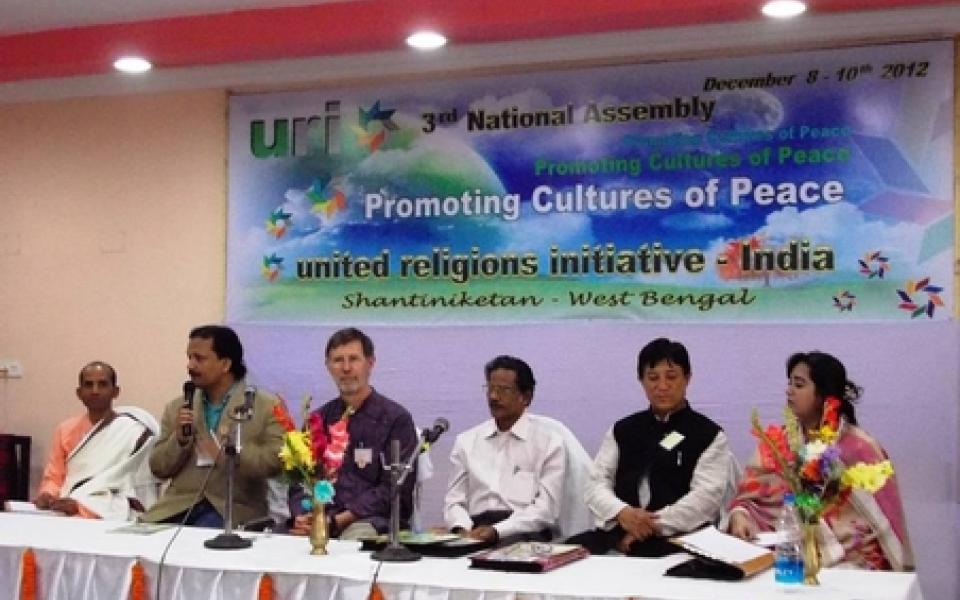
URI Executive Director Rev. Charles Gibbs offers these thoughts while attending the third URI All India Assembly in Shantiniketan.
Dear Friends,
Greetings of love and peace from Shantiniketan.
I was up in the growing light of early dawn before sunrise this morning and walked through the mostly quiet streets as this town was just beginning to wake up. Birds were singing from the dusty-leaved branches of many trees. Skinny Indian dogs were out brightly exploring the new day, long tails curved high in the air, or were still curled in blissful sleep just off the road, oblivious to the occasional car or truck passing less than a foot away.
The few people out smiled and nodded their heads sideways in an endearing acknowledgement of a fellow human, no matter how out of place that fellow human may have seemed. Occasionally, a lone cow or a group of two or three together sauntered and swayed down the middle of the road. I suppose by now there is a genetic trait passed on through the generations that tells cows (and dogs for that matter) that they have nothing to fear from the traffic (though cows probably less so than dogs). Most of the time they’re right.
It was an altogether peaceful walk in the relatively clear air, the only obvious pollution coming from the occasional small cook fire – fueled by dried cow dung pies or burnable rubbish – outside a small roadside hut that is what passes for the local coffee/tea stand.
As I returned from my walk, I encountered several members of our assembly out for theirs. Others were stirring in the courtyard when I returned, the adults drinking coffee or tea, the younger boys exploring the grounds, no doubt looking for some sort of boyish mischief.
After an engaging breakfast with the India team, we gathered in the meeting room for an opening prayer. Since it was Sunday morning, several Christians were invited to offer reflections (mostly invoking Jesus as the Prince of Peace) or prayers, with all joining in with the Lord’s Prayer before I was asked to give a closing blessing.
After Biswadeb (Chakraborty, URI's Subregional Coordinator for India's East Zone) offered an overview of the day’s agenda, I was asked to provide an international perspective on URI. Since several of the participants don’t speak English, Qutub (Jehan Kidwai, URI's Subregional Coordinator for India's West Zone) translated my remarks as we went along. The one exception was when we read the Preamble to URI’s Charter in English in unison. Both in telling URI’s birth story and talking about where URI is today, I did my best to stress the role leaders from India have played/are playing in helping to create and grow URI.
Earlier in the morning I’d had the opportunity to talk to a woman who is doing impressive grassroots work in a program supporting women’s livelihood (the program was recently given a sewing machine to test, with the promise that more would be on the way if this one worked out) and with a man from a remote tribal community that is organizing against the government building a dam that would displace over 40 villages, as well as working to counteract the devastating impact of companies engaged in resource extraction that destroys local environment while providing little or no economic benefit to local communities. I was able to use their work as examples of the great work here in India and offer examples of similar URI work in other parts of the world. Sadly, in both cases issues with language and technology pose major challenges to connect the people here with their URI colleagues. I’m not sure how we work effectively with these challenges.
After my talk and a tea break, we hosted representatives of local and national media for a press conference that was to focus on remarks by Swami Chaturvedi. Since Swamiji was delayed in arriving, I was once again called into service, along with our India zone leaders. After I provided a global overview but also stressed to the media that the room was filled with unsung heroes whose work deserved to be shared with the public, Qutub, Hira Paul (Gangnegi, URI's Subregional Coordinator for India's North Zone), Abraham (Karickam, URI's Subregional Coordinator for India's South Zone) and Biswadeb each spoke about specific work going on in each zone. From work on women’s empowerment to environmental work to education to human rights work to providing urgent health care, the range of work and evident commitment of URI members was impressive, evoking many questions asking for more detail. It will be interesting to hear what coverage results.
There’s more of the day to share, but I’ll end here for now with a quote from Tagore: “The roots beneath the earth claim no rewards for making the branches fruitful.”
Faithfully,
Charles
The Rev. Charles P. Gibbs
Executive Director, United Religions Initiative
